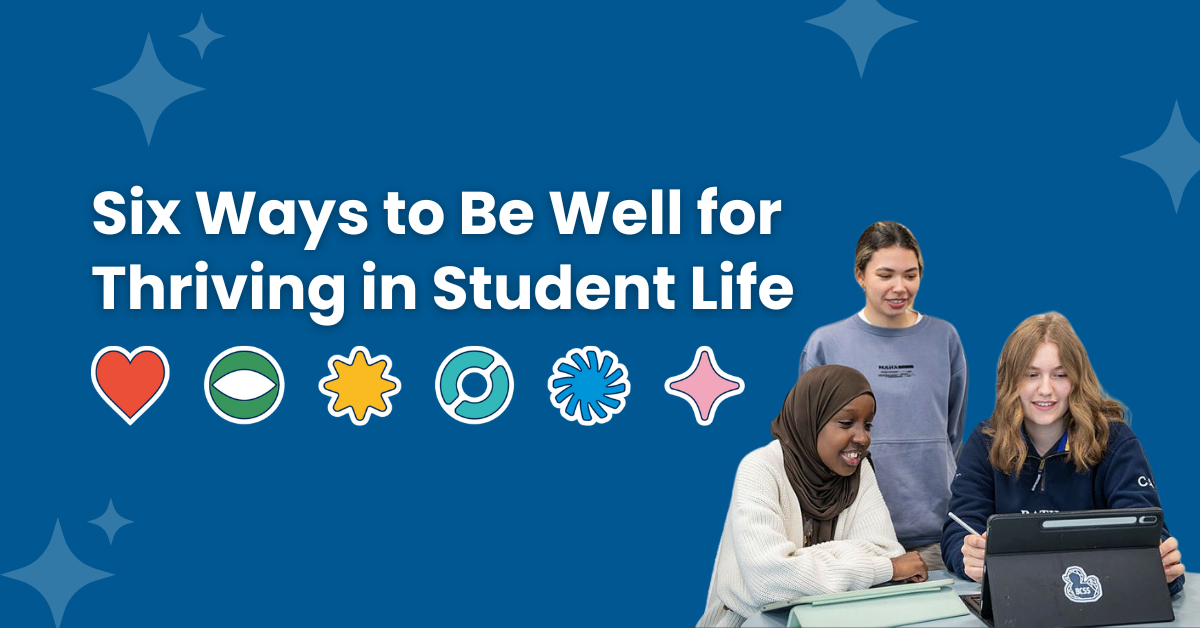Prioritising your wellbeing is key to balancing studies and self-care. In this blog, Aqida shares how integrating the Six Ways to Be Well into her routine has helped her manage stress and maintain a healthy lifestyle.
Balancing the demands of a busy student life whilst maintaining your wellbeing can be challenging. Like many students, I sometimes find myself prioritising work over self-care. But learning to strike a healthy balance between studying hard and looking after yourself is essential to improve your overall wellbeing. If you’re unsure where to begin, the ‘Six Ways to Be Well’ provides a useful framework that breaks wellbeing into six key themes: Be Active, Take Notice, Be Healthy, Connect, Give and Keep Learning. These themes highlight that wellbeing is about making small, intentional changes to your everyday life. With time, these practices can then become habits, which is key to living a balanced life and improved wellbeing.
Throughout my time at university, I’ve been exploring ways to integrate these principles into my routine and have noticed how even the smallest steps can make a difference! Here’s how I’ve been applying the Six Ways to my life as a university student and some tips on how you can do the same.
1. Be active
Staying active is necessary for enhancing our wellbeing. Apart from its importance for physical health, staying active has several well-documented mental health benefits, like reducing anxiety and improving concentration, which is especially helpful for aiding learning!
I started going to the gym last year with little knowledge about working out or how to exercise effectively. At first, it felt overwhelming, but going with a friend made the process so much easier. Having her there for support not only made me feel more comfortable but also more motivated! It turned going to the gym something I looked forward to, and it was encouraging to have someone share the journey with me. Another small tip that has also motivated me is laying out my gym attire the night before. Seeing them ready in the morning and waiting for me to wear them creates just enough guilt to push me out the door – even if it’s for a quick 30-minute workout!
However, staying active does not always have to come with a cost. The university offers several free options, like booking badminton courts or even dog-walking if you’re looking for something less intense. Recently, I’ve started playing badminton more regularly and seeing the progress I’ve made has been such a confidence boost. I’d also highly recommend checking out the university’s ‘Get Active’ programme. You get paired with Exercise Buddies, who offer helpful guidance and encouragement to help you stay active!
2. Take notice
Taking notice means bringing our attention to the present moment, focusing not only on ourselves but also on the world around us. This practice can help us stay calm, regulate our stress levels, and approach problems more effectively.
As a student, I often find my thoughts drifting to future worries - graduation, exams, career plans and so on. While it’s natural and important to think about these, constantly worrying over future events can be anxiety-provoking. I’ve found that taking a moment to pause and notice my thoughts has helped me avoid getting caught up in them. I’ve learnt how to stay grounded and focus more on what’s happening right now.
One of my favourite places to practice taking notice is along the Bath Riverside. During my walks, I try to pay attention to small details, like the changing colour of the leaves or birds flying by. Recently, I read a blog about how to be mindful in nature that suggested asking yourself questions like “Am I taking notice of the sounds and smells around me?” or “Is my mind focused on the present, the past, or the future?”. These questions have been handy in helping me bring my awareness to my mind and surroundings. Other times, I listen to a mindfulness podcast as I walk – the BeWell app has several great podcasts I’d recommend! Recently I’ve also started incorporating this practice into my morning routine, like on the way to the bus stop to ensure I do it every day. Now, I find myself being more aware of the present moment and more appreciative of the nature in my surroundings than I was before. Practising the ability to stop and take notice can seem difficult at first, but with continued practice, it becomes easier and more natural. It’s a habit that genuinely improves my day and I promise it’s worth trying!
3. Be Healthy
With a busy schedule, it’s easy for students to overlook the importance of staying healthy. It’s not surprising to hear stories of unhealthy sleep schedules or the excessive consumption of caffeine to stay awake. Many of us also often reach for ready meals instead of cooking – a habit I admit I’ve done before! However, being healthy is the foundation for overall wellbeing. It fuels every aspect of our lives as good health not only benefits our physical health but also supports our mind.
I’ve found that a few simple habits, like meal-prepping, can make being healthy so much easier. For example, on days I have morning lectures, I make sure to prepare my breakfast the night before. Usually, I make overnight oats which only take 5 minutes to prepare – so there really is no excuse for me to not eat healthy! This way I always have a nutritious and filling breakfast ready to eat, rather than relying on quick breakfast bars or skipping meals altogether. Additionally, keeping a water bottle with me at all times reminds me to stay hydrated throughout the day!
Apart from time constraints, not knowing how to cook can also make those ready meals more appealing. However, the university offers free cooking classes which is perfect for beginners. These classes teach you how to prepare simple and healthy recipes, and the best part is that you get to enjoy what you’ve made after! I’d also recommend taking some time each week to plan your meals. This not only prevents the common problem of “I don’t know what to eat!” but can also guide your food shopping to prevent food waste! By dedicating some effort to learning healthy recipes and trying meal prepping, you can enjoy nutritious meals that support your wellbeing!
4. Connect
Being connected to others is fundamental to our wellbeing. Whether through friendships or family, social connection contributes to feelings of belonging, boosts our mood and lowers stress levels.
One great way to build these connections is by joining a society. In my first year, I joined BAMSA – a society for Malaysian, Singaporean and Bruneian students in Bath. Attending their events helped me immensely with reducing feelings of loneliness and eased my transition to university life. I was able to connect with more like-minded people and make friendships for a lifetime! You can explore over 100 societies on the SU website, so there is guaranteed to be something for everyone! Apart from societies, there are also other options like joining the Social Networking Group. This is a weekly social group for students who may be feeling lonely or isolated. It’s a safe and welcoming space to meet others and form connections, with free snacks available if you need a little fuel while making friends! Another way I’ve strengthened my social connections is by reaching out to old friends more often. This does take some courage to do, but with time, these interactions become easier.
Having said this, it’s also important to remember to not push yourself too far with socialising. It can lead to feelings of burnout and can be really draining for some. I’ve definitely felt this before so taking it at your own pace is key. This ensures that reaching out and connecting with people is a positive rather than an overwhelming experience.
5. Give
Giving your time and effort to help others can work wonders for your wellbeing. Acts of kindness have been linked with enhanced self-esteem and lower depression levels, making it one of the most fulfilling ways to improve your wellbeing.
For me, dedicating my time as a wellbeing ambassador has been extremely rewarding and beneficial to my wellbeing. I currently help run a programme called ‘Green Minds’, where we explore beautiful outdoor spots in Bath with a group of students. Contributing to this programme has been a wonderful experience so far – giving my time to foster a safe environment for people to connect has felt extremely gratifying. Volunteering has been another fantastic way to give back. I’ve volunteered in schools before this year I’m assisting children with reading online – a role that fits more comfortably into my busy 3rd year schedule! If you check the SU website, you’ll find a range of volunteer opportunities throughout the year, from working with animals to supporting adults, so there’s always something to suit everyone!
However, giving doesn’t need to be a major commitment to be impactful. Doing small gestures, like writing a letter to a friend or baking brownies for someone who’s unwell, can be just as meaningful. I also find that journaling about these moments after helps me reflect on the benefits of giving. Through this, I’ve come to realise that acts of kindness don’t need to be big - every kind act has the power to make a positive difference in our lives.
6. Keep learning
Regular learning can also be incredibly beneficial for our wellbeing. It enhances our self-esteem and adds a sense of purpose to our lives. Learning something new can also provide a refreshing change from our main studies, which I’ve found to be helpful in preventing boredom from studying the same subject all week.
Outside of lectures, I’ve been taking Chinese classes at the university. Starting as a beginner in my first year and progressing to an intermediate level has been so worthwhile and boosted my confidence immensely! It has also added some variety to my timetable and challenges my mind in a new way, which I find really valuable. Committing to a language course though isn’t always easy – finding the time to fit it alongside a hectic schedule can be difficult, especially as deadlines and exams become more intense. In this case, it can be useful to try learning a language at your own pace! For anyone who might want to try learning at a more flexible pace, there are plenty of free resources available online. I’ve enjoyed using resources like MandarinBean to read Chinese stories and watching lessons from YouTube videos. Setting aside a couple of hours a week and aiming for small, achievable goals like learning five new words a week can make a difference in improving your skills. These simple steps can also make learning more enjoyable too!
I hope these tips help you with looking after your wellbeing! Remember that prioritising your wellness does not have to mean making big changes – starting with small steps every day can be just as beneficial. Whether it’s through movement, connection or learning something new, each step you take is progress towards making a healthier you. You’ve got this!
Respond



